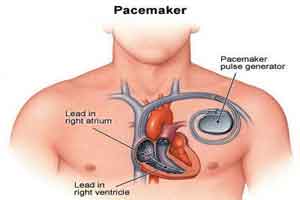- Home
- Editorial
- News
- Practice Guidelines
- Anesthesiology Guidelines
- Cancer Guidelines
- Cardiac Sciences Guidelines
- Critical Care Guidelines
- Dentistry Guidelines
- Dermatology Guidelines
- Diabetes and Endo Guidelines
- Diagnostics Guidelines
- ENT Guidelines
- Featured Practice Guidelines
- Gastroenterology Guidelines
- Geriatrics Guidelines
- Medicine Guidelines
- Nephrology Guidelines
- Neurosciences Guidelines
- Obs and Gynae Guidelines
- Ophthalmology Guidelines
- Orthopaedics Guidelines
- Paediatrics Guidelines
- Psychiatry Guidelines
- Pulmonology Guidelines
- Radiology Guidelines
- Surgery Guidelines
- Urology Guidelines
World’s smallest pacemaker revealed

Houston Methodist Hospital is one of the first hospitals in Texas to offer the world's smallest pacemaker for patients with bradycardia, a condition characterized by a slow heart rate, usually fewer than 60 beats per minute.
The Micra® Transcatheter Pacing System (TPS), recently approved by the Food and Drug Administration (FDA), is a new type of heart device that provides patients with the most advanced pacing technology at one-tenth the size of a traditional pacemaker and is the only leadless pacemaker approved for use in the U.S. The device is the size of a large vitamin, and unlike traditional pacemakers, it does not require cardiac wires (leads) or a surgical "pocket" under the skin to deliver a pacing therapy.
When a lower heart rate is present, the heart is unable to pump enough oxygen-rich blood to the body during normal activity or exercise, causing dizziness, fatigue, shortness of breath or fainting spells. Pacemakers are the most common way to treat bradycardia to help restore the heart's normal rhythm and relieve symptoms by sending electrical impulses to the heart to increase the heart rate.
"The device is small enough to be delivered through a catheter and implanted directly into the heart, providing a safe alternative to conventional pacemakers without the complications associated with leads," Paul Schurmann, M.D., a cardiologist with Houston Methodist Hospital who implanted the device. "The device also allows us to automatically adjust pacing therapy based on a patient's activity levels and another positive is the battery can last up to 10 years."
For patients who need more than one heart device, the miniaturized Micra® TPS was designed with a unique feature that enables it to be permanently turned off so it can remain in the body and a new device can be implanted without risk of electrical interaction.
"This is not a complicated procedure and the first patient that we implanted is doing extremely well," Schurmann said. "I believe this gives us another tool to help save lives of patients with slow or irregular heart rhythms."

Disclaimer: This site is primarily intended for healthcare professionals. Any content/information on this website does not replace the advice of medical and/or health professionals and should not be construed as medical/diagnostic advice/endorsement or prescription. Use of this site is subject to our terms of use, privacy policy, advertisement policy. © 2020 Minerva Medical Treatment Pvt Ltd